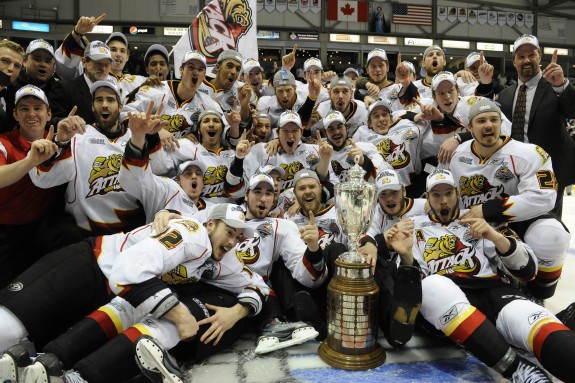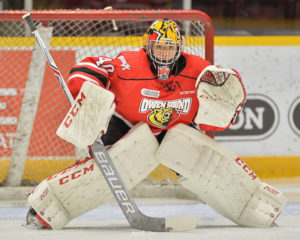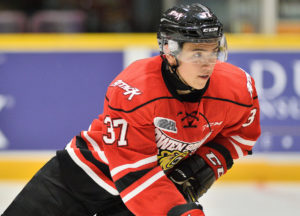The first round of the Ontario Hockey League (OHL) playoffs is underway. Old rivalries are heating up, new rivalries are igniting, and with the stakes raised and all but a few teams still in the running, fan loyalty is at its annual peak.
But something curious is happening. Fans from Ottawa to Sault Ste. Marie are lining up behind the Owen Sound Attack as the team they would most like to see go all the way if their own team is eliminated. And the Attack are well on their way, dominating their Western Conference Quarterfinal match-up with the Kitchener Rangers. This despite the herculean efforts of Rangers goaltender Luke Opilka, who stopped a remarkable 64 shots in Wednesday’s Game 4.
What is it about this year’s Attack that has so captivated the imagination of the OHL community? I think we can point to a number of reasons fans of other teams might admire Owen Sound.
What Have You Done for Me Lately?
Some OHL myths last, while others fade. Despite five straight years without a playoff series victory, the Windsor Spitfires appear to have retained their reputation as a power player in the OHL (back-to-back Memorial Cup championships in 2009 and 2010 certainly help). But Owen Sound, despite winning their own OHL title back in 2011 and playing .600 hockey since, doesn’t appear to have earned the same benefit of the doubt.
Part of this is almost certainly a lack of playoff success. Since rebranding themselves from the Owen Sound Platers to the Attack in 2000, they have pushed through to the second round of the playoffs just four times and the Conference Finals once. Many have noted that last year’s Attack handed the eventual Memorial Cup champion Knights their only two losses in 22 playoff games. But when putting up a decent fight against a powerhouse team is your signature playoff accomplishment, it’s hard to shake the label of the feisty upstart.

This makes the Attack an interesting contrast to the Erie Otters and Sault Ste. Marie Greyhounds, two other Western Conference contenders with longer title droughts but more recent playoff success.
The Otters haven’t won a title since 2002, and endured their own torpid stretch of nine years without a playoff series win before shooting to the top of the standings in 2013-14; they’ve since run off a string of four-straight 50 win seasons. The Greyhounds, meanwhile, are looking to end a 24-year championship drought. Like the Otters, they struggled in the late ‘00s and early ‘10s but have come on strong in recent seasons, including a 110-point campaign in 2014-2015.
Why are many fans choosing to cast their lot with the Attack, who won the league as recently as six years ago, while the Otters and Greyhounds sit on much larger championship droughts? It may be that in the eyes of opposing fans, championship runs mean as much as championships; consider the way fans viewed London’s remarkable run from 2004 to 2010, which produced six 100-point teams but only one Robertson Cup. Or it may simply be that in the what-have-you-done-for-me-lately world of junior hockey, 2011 was a long time ago.
A Historic Season-Closing Run
There’s also something seductive about the Attack’s remarkable run to close the season. On December

4th, the Otters shellacked the Attack 6-1 in Owen Sound, their second victory over the Attack in as many nights. This left the Attack’s record a pedestrian 16-13-1. Owen Sound had just 10 regulation wins in 30 games—nearly half the season—and sat a mediocre sixth in a tough Western Conference. Embarrassed by the league leaders in their own barn and trailing a group of tough contenders, the Attack risked being dismissed as an also-ran.
How did coach Ryan McGill’s team respond? By running off a team-record 15-game winning streak that was, somehow, only the beginning. When the dust settled, the Attack had closed with a record of 33-2-3, outscoring their opponents by almost three goals per game and finishing just a point back of the Otters in the race for the Hamilton Spectator trophy.
The pecking order in a given OHL season is often established early. The 2015 Memorial Cup champion Oshawa Generals led the league almost wire-to-wire. Though last year’s Knights finished a nominal second to the Otters in the regular season, they started the year 23-4-2 and were near the top of the standings all season. And while we’ve seen contenders in recent years run off impressive winning streaks after adding big at the trade deadline—the 2014-15 Greyhounds closed 26-3 after adding Nick Ritchie, Anthony DeAngelo, and others—the Attack picked up just one player at the deadline, adding overage forward and erstwhile Barrie captain Cordell James for a single fourth-round pick. (The team also picked up winger Chase Campbell in early December for a third-rounder.)
James was a big add for the Attack, putting up 21 goals in 28 games playing on the team’s second line. But overall, the Attack bucked the modern OHL trend of cyclical contention, electing to trust their core and keep key pieces in the fold for subsequent runs. For a team to go from also-ran to world-beater in 40 games with virtually no changes in personnel is as unusual as it is impressive. That few predicted the Attack to contend at the beginning of the season made this incredible run all the more unexpected—and the unusual and the unexpected are some of the most compelling stories in sports.
Who Are These Guys, Anyway?

Three Attack players finished in the top ten in OHL scoring this season, and five in the top twenty. None of these players have been drafted. Forwards Nick Suzuki (projected as a late first-round pick) and Jonah Gadjovich are draft-eligible this year; the other four, defenceman and captain Santino Centorame and forwards Petrus Palmu and Kevin Hancock, have all been passed over at least once.
Even more remarkably, the Attack iced a roster this year with only two NHL-drafted players in total. (A third, goaltender Michael McNiven, was signed by the Canadiens as a free agent.) In this respect, the Attack lag far behind the other Western Conference contenders: London and Windsor have 10 NHL draftees, Erie and Sault Ste. Marie eight. But the games are played on the ice, not on an NHL GM’s draft board, and if the Attack’s stars, playing in the smallest arena in the league and hailing from a metropolitan area less than half the size of the next smallest market, were little known prior to the season, their performance this year has served the league and made the wider hockey community notice.
Everyone loves an underdog story. And while the Attack are far from the underdogs, fans can be forgiven for seeing them that way. A group of relative unknowns charging from way behind to catch the OHL’s big boys and putting up record-breaking numbers in the process? It’s not difficult to see why fans from across the league might want to cheer for the Owen Sound Attack. And if the Attack keep playing the way they’ve shown they can play, those fans could be cheering all the way to a Memorial Cup.